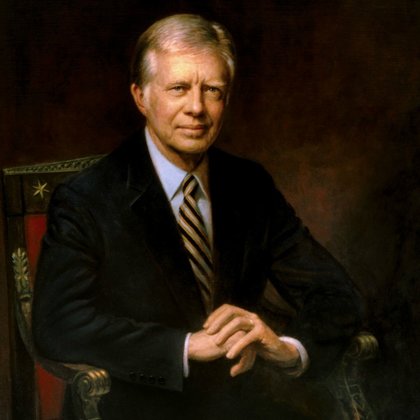JIMMY CARTER PRESIDENTIAL ( 1977 -1981),JAMES EARL CARTER JR.SERVED 39TH PRESIDENT OF THE UNITED STATES,PRESIDENT CARTER PLAYED A KEY ROLE IN THE CAMP DAVID PEACE ACCORDS.THE IRANIAN HOSTAGE CRISIS PROVED TO BE A SIGNIFICANT FACTOR IN THE 1980 LOSS TO RONALD REAGAN.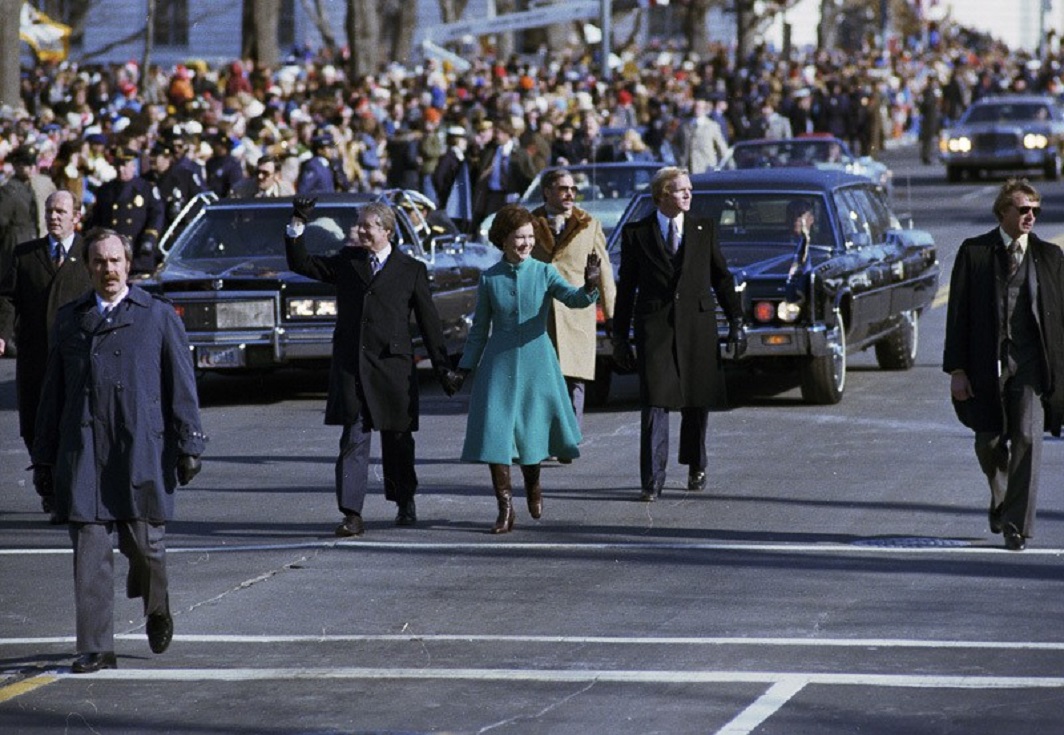
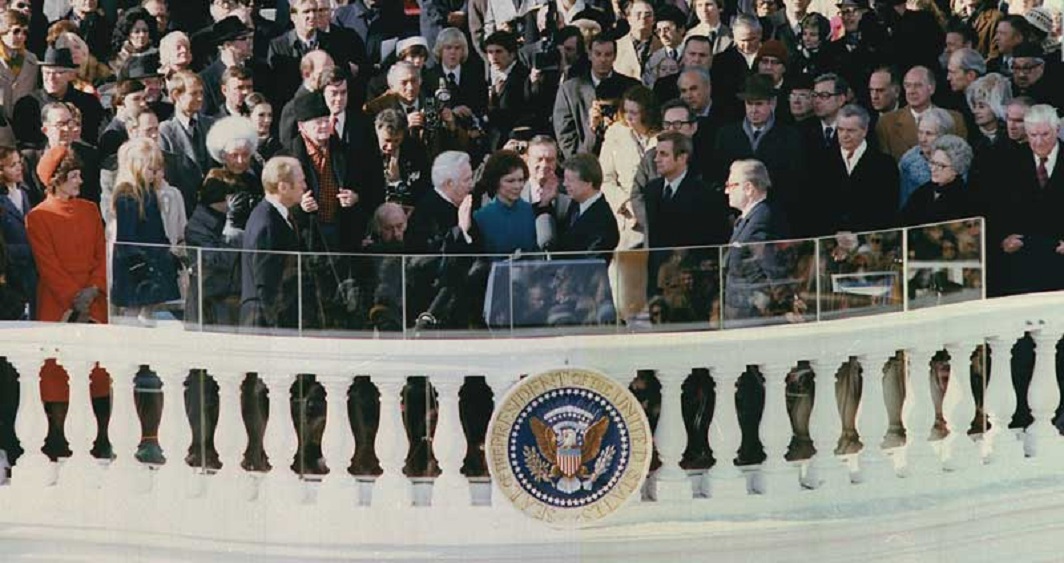 President and Mrs. Carter walk down Pennsylvania Avenue during Inaugural Parade, 1977.The Inauguration of Jimmy Carter as the 39th President of the United States was held on Thursday, January 20, 1977, on the East Portico of the United States Capitol in Washington D.C.. The inauguration marked the commencement of the only four-year term of Jimmy Carter as President and of Walter Mondale as Vice President. Chief Justice Warren E. Burger administered the presidential oath of office to Carter, and Speaker of the House Tip O'Neill administered the vice presidential oath of office to Mondale.This was the last inauguration held on the East Portico of the Capitol building to date.
President and Mrs. Carter walk down Pennsylvania Avenue during Inaugural Parade, 1977.The Inauguration of Jimmy Carter as the 39th President of the United States was held on Thursday, January 20, 1977, on the East Portico of the United States Capitol in Washington D.C.. The inauguration marked the commencement of the only four-year term of Jimmy Carter as President and of Walter Mondale as Vice President. Chief Justice Warren E. Burger administered the presidential oath of office to Carter, and Speaker of the House Tip O'Neill administered the vice presidential oath of office to Mondale.This was the last inauguration held on the East Portico of the Capitol building to date.
James Earl Carter was born on October 1, 1924, in Plains, Georgia to James Carter, Sr. and Lillian Gordy Carter. His father was a farmer and a local public official. His mother volunteered for the Peace Corps. Jimmy grew up working in the fields. He finished public high school and then attended the Georgia Institute of Technology before being accepted into the U.S. Naval Academy in 1943. Carter married Eleanor Rosalynn Smith on July 7, 1946, soon after he graduated from the U.S. Naval Academy. She was the best friend of Carter's sister Ruth. Together, the Carters had four children: John William, James Earl III, Donnel Jeffrey, and Amy Lynn. Amy lived in the White House from age nine until thirteen.He says: Rosalynn Carter: "Rosalynn is probably the most influential person in my life."Father, James Earl Carter, Sr.: "He was my best friend."Mother, Lillian Gordy Carter: "My mother was compassionate, dynamic, humorous, inquisitive in her attitude about life."Charles Kirbo: "Going to see Charles Kirbo was probably one of the smartest things I ever did in my life."Julia Coleman: The superintendent of the Plains schools, she encouraged him to learn more about music, art and literature.Admiral Hyman Rickover: "Hyman Rickover is by any measure a remarkable man."President Harry Truman: "Harry Truman is my favorite president and the one I admire most."As First Lady, Rosalynn was one of her husband's closest advisers, sitting in on many cabinet meetings. She has spent her life devoted to helping people around the world. In 1974, Jimmy Carter declared his candidacy for the 1976 Democratic presidential nomination. He was unknown by the public but that outsider status helped him in the long run. He ran on the idea that Washington needed a leader they could trust after Watergate and Vietnam. By the time the presidential campaign began he led in the polls by thirty points. He ran against President Gerald Ford and won in a very close vote with Carter winning 50 percent of the popular vote and 297 out of 538 electoral votes. He was an unlucky president. He came to power shortly after the American failure in Vietnam and the Watergate scandals. Since the late 1960s, a "leadership crisis," characterized by widespread, deep, and serious lack of confidence in the leaders the system supplied, had been a major feature of American politics. Also before he became president, an "energy crisis" and other economic troubles had emerged, raising doubts about the future of American power and prosperity. Carter was highly sensitive to these developments and shared the skepticism about "Washington" contained in them. Yet, he had confidence that his own personal qualities could end the leadership crisis. That confidence, coupled with a sense of the limits of power, dominated his approach to the presidency. But, faced with an unusually tough situation, he did not end the crisis. In fact, the American people, many of them convinced that he was weak and lacked direction, gave him only one term to reestablish confidence.Energy policy was very important to Carter. However, his progressive energy plans were severely curtailed in Congress. The most important task he accomplished was creating the Department of Energy with James Schlesinger as its first secretary.The Three Mile Island nuclear power plant incident that occurred in March 1979, allowed for key legislation changing regulations, planning, and operations at nuclear power plants.When Carter became President, Egypt and Israel had been at war for some time. In 1978, President Carter invited Egyptian President Anwar Sadat and Israeli Prime Minister Menachem Begin to Camp David. This led to the Camp David Accords and a formal peace treaty in 1979. With the accords, a united Arab front no longer existed against Israel. On November 4, 1979, sixty Americans were taken hostage when the U.S. embassy in Tehran, Iran, was overrun. The Ayatollah Khomeini, leader of Iran, demanded the return of the Reza Shah to stand trial in exchange for the hostages. When America did not comply, fifty-two of the hostages were held for more than a year. Carter attempted to rescue the hostages in 1980. However, this attempt failed when helicopters malfunctioned. Eventually, economic sanctions placed upon Iran took their toll. The Ayatollah Khomeini agreed to release the hostages in exchange for the unfreezing of Iranian assets in the United States. However, Carter was unable to take credit for the release as they were held until Reagan was officially inaugurated as president. Carter failed to win reelection partially due to the hostage crisis.Carter retired to Plains, Georgia. Since then, Carter has been a diplomatic and humanitarian leader. He and his wife are heavily involved in Habitat for Humanity. In addition, he has involved in both official and personal diplomatic endeavors. In 1994, he helped create an agreement with North Korea to stabilize the region. In 2002, he was awarded the Nobel Peace Prize “for his decades of untiring effort to find peaceful solutions to international conflicts, to advance democracy and human rights, and to promote economic and social development.”
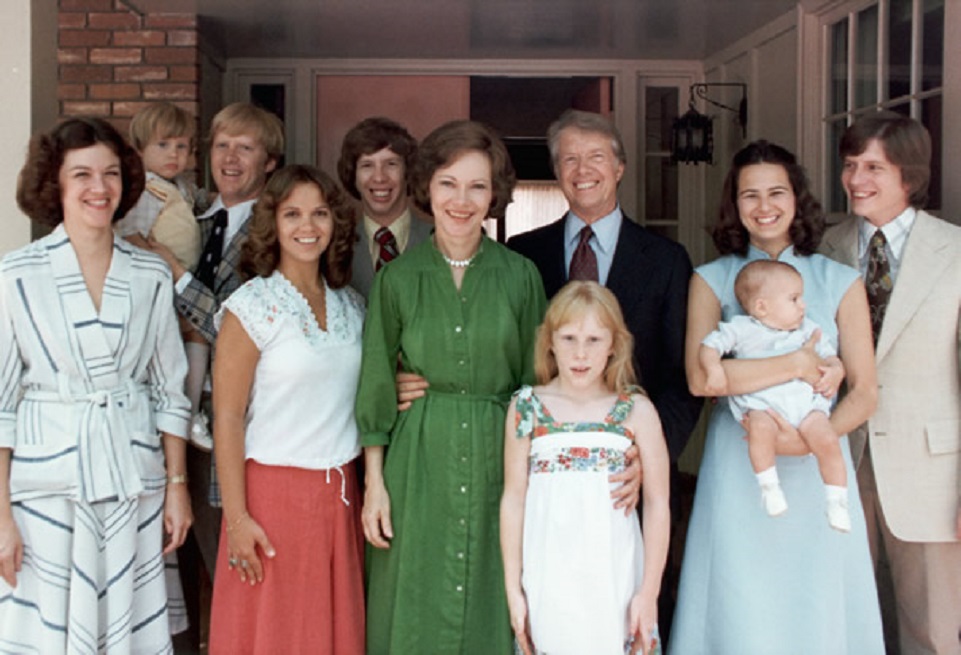 Jimmy Carter with Family - Jimmy Carter
Wife - Eleanor Rosalynn Carter
Son - John William Carter Also named "Jack" (Born in 1947)
Second Oldest Son - James Earl Carter III, also named "Chip".
(Born 1950)
Third Oldest Son - Donnel Jeffery Carter. Also named "Jeff". (Born 1952)
Fourth Youngest Daughter -
Amy Lynn Carter (1967)
Jimmy Carter with Family - Jimmy Carter
Wife - Eleanor Rosalynn Carter
Son - John William Carter Also named "Jack" (Born in 1947)
Second Oldest Son - James Earl Carter III, also named "Chip".
(Born 1950)
Third Oldest Son - Donnel Jeffery Carter. Also named "Jeff". (Born 1952)
Fourth Youngest Daughter -
Amy Lynn Carter (1967)
The Camp David Accords
The Camp David Accords was a peace treaty signed September 17, 1978 between Israel and Egypt at Camp David, the country retreat of the President of the United States. The Camp David Accords were agreed during 12 days of talks between Egyptian President Anwar El Sadat, Israeli Prime Minister Menachem Begin,Begin played a major role in the Jewish resisting of the British Mandate of Palestine. He was elected Prime Minister in 1977, after finally getting elected after eight years of defeat. Begin's first major action as Prime Minister was the Camp David Accords with the President Sadat of Egypt. Begin belonged to the Likud political party and he promoted the expansion of Jews in Israel. Begin resigned as Prime Minister in September of 1983, due to lots of stress and pressure that was put on him . The two nations of Israel and Egypt had been bitter enemies for decades. The role of President Carter as the broker of the historic peace treaty, referred to as the Camp David Accords, was hailed as a great success, and perceived as marking the first step to achieving peace in the Middle East. Most other Arab nations, and many Egyptians, denounced the treaty and Egypt was expelled from the Arab League. President Anwar Sadat's signing of the Camp David Accords led to his assassination in 1981 by dissatisfied Islamic extremists from within Egypt.The White House National Security Council staff, spent thirteen momentous days at Camp David, the presidential retreat in Maryland, where three world leaders were holding secret negotiations. When U.S. President Jimmy Carter, Egyptian President Anwar Sadat, and Israeli Prime Minister Menachem Begin emerged on September 17, they announced a monumental accomplishment: the first peace agreement between Israel and one of its Arab neighbors.Praised by some for laying the foundations for peace between Egypt and Israel, the accords have also been criticized for failing to achieve a comprehensive settlement, including a resolution of the Palestinian question. But supporters and critics alike recognize the importance of what happened at Camp David, and both groups acknowledge the vital role played by the United States in reaching an agreement.The Camp David has provided a comprehensive and lasting guide to the difficult negotiations surrounding the talks, including the fraught scenario leading up to the meetings at the presidential retreat and the talks and accord that would lead to Sadat and Begin jointly receiving the 1978 Nobel Peace Prize. Just 11 days earlier, Egyptian president Anwar Sadat had dazzled Israel by landing at Ben Gurion Airport and spending three days meeting with Israeli prime minister Menachem Begin, visiting Yad Vashem, speaking at the Knesset, and praying at al-Aqsa Mosque. But no mechanism was put into place to sustain bilateral contact with Egypt following Sadat’s departure.Anwar Sadat had requested that an Israeli representative be placed at the American Embassy in Cairo, under cover as a diplomat. According to the plan, only the US ambassador would know that the new arrival was, in fact, working for Israel.Relations between Israel and Egypt remained tense after the 1973 Yom Kippur War. Negotiations had gone on for five years and progress was frustratingly slow. Egyptian President Anwar Sadat helped break the logjam with his historic visit to Jerusalem in October 1977, while Israeli Prime Minister Menachem Begin countered with a 26-point plan, which would set up an interim local Palestinian government on the West Bank for five years, while Israeli troops would continue to handle defense and security matters.The first nine months of the Carter administration were devoted to trying to draw some terms of reference for another Middle East conference, substantive objectives and an organizational structure for comprehensive peace negotiations. All these efforts raised major issues.Towards the end of this period, Egyptian President Anwar Sadat became frustrated by the slowness of our approach and its extreme legalistic framework. He came to the conclusion that he had to break things loose. Hence his visit to Jerusalem, which was essentially his idea we were not party to that decision.Egypt, Israel and the U.S. which went on into early 1978. Assistant Secretary of State for Near East Affairs and later Ambassador to Egyp Roy Atherton was asked to concentrate on the Middle East process in an effort to establish a set of principles that Egypt and Israel might agree on. It was hoped that Roy’s efforts could lead either to a resumption of the Geneva conference, the international attempt to negotiation a solution to the Arab-Israeli conflict or at least to an Israel-Egypt agreement of some kind.
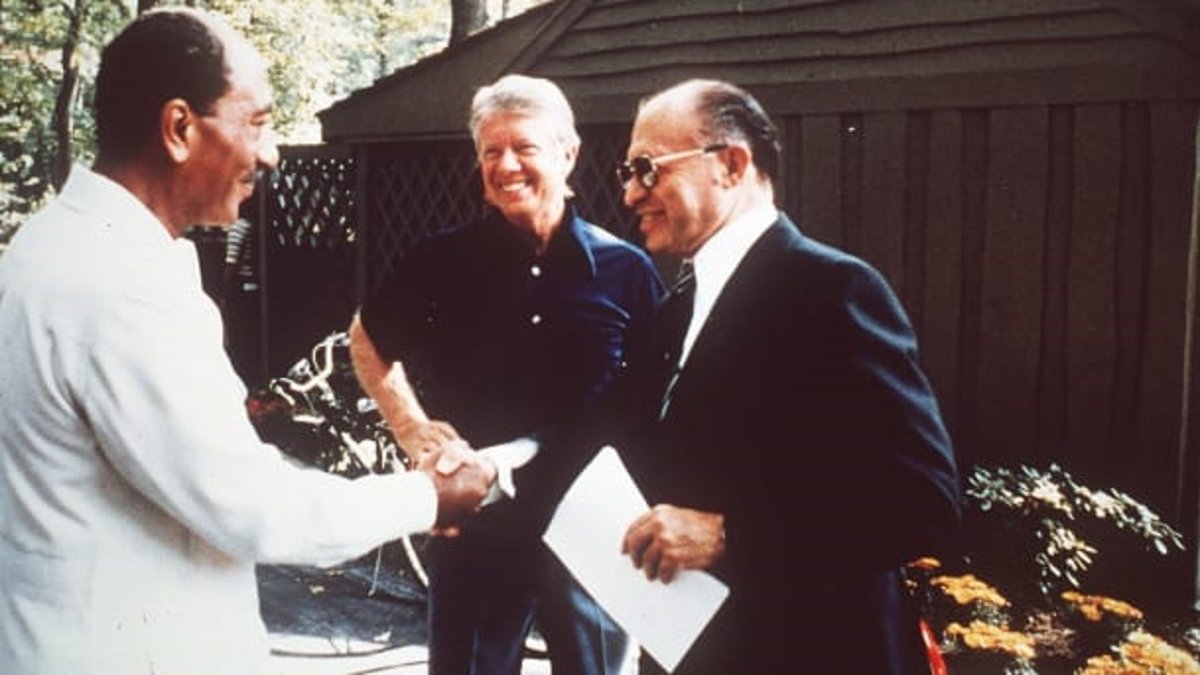 Jimmy Carter Menachem Begin was a Polish-Jewish leader of an underground Zionist group. He was the 6th Prime Minister of Israel. Anwar Al Sadat was one of the most influential and significant Arab figures in modern world history. He served as the President of Egypt for 11 years until his assassination on October 6, 1981. Sadat became president after his predecessor, Gamal Nasser died in 1970. Sadat was involved with the Camp David Accords, along with the United States.
Jimmy Carter Menachem Begin was a Polish-Jewish leader of an underground Zionist group. He was the 6th Prime Minister of Israel. Anwar Al Sadat was one of the most influential and significant Arab figures in modern world history. He served as the President of Egypt for 11 years until his assassination on October 6, 1981. Sadat became president after his predecessor, Gamal Nasser died in 1970. Sadat was involved with the Camp David Accords, along with the United States.
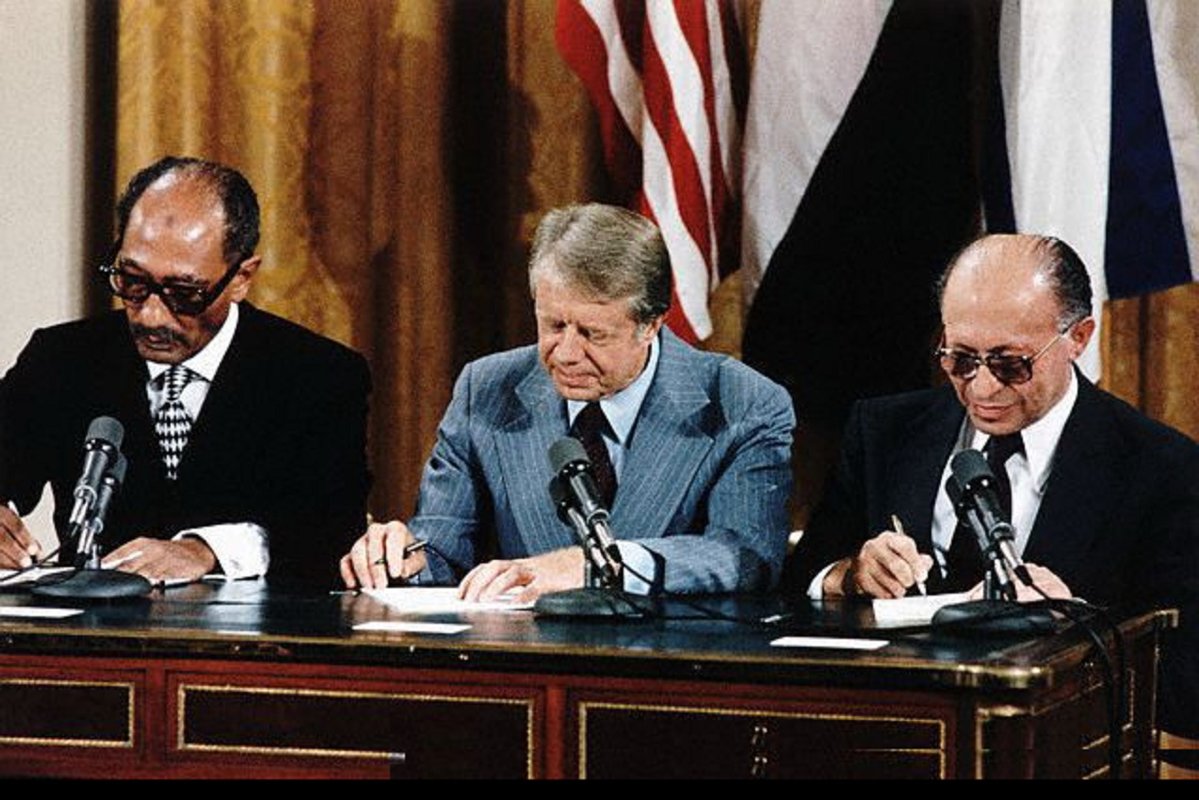
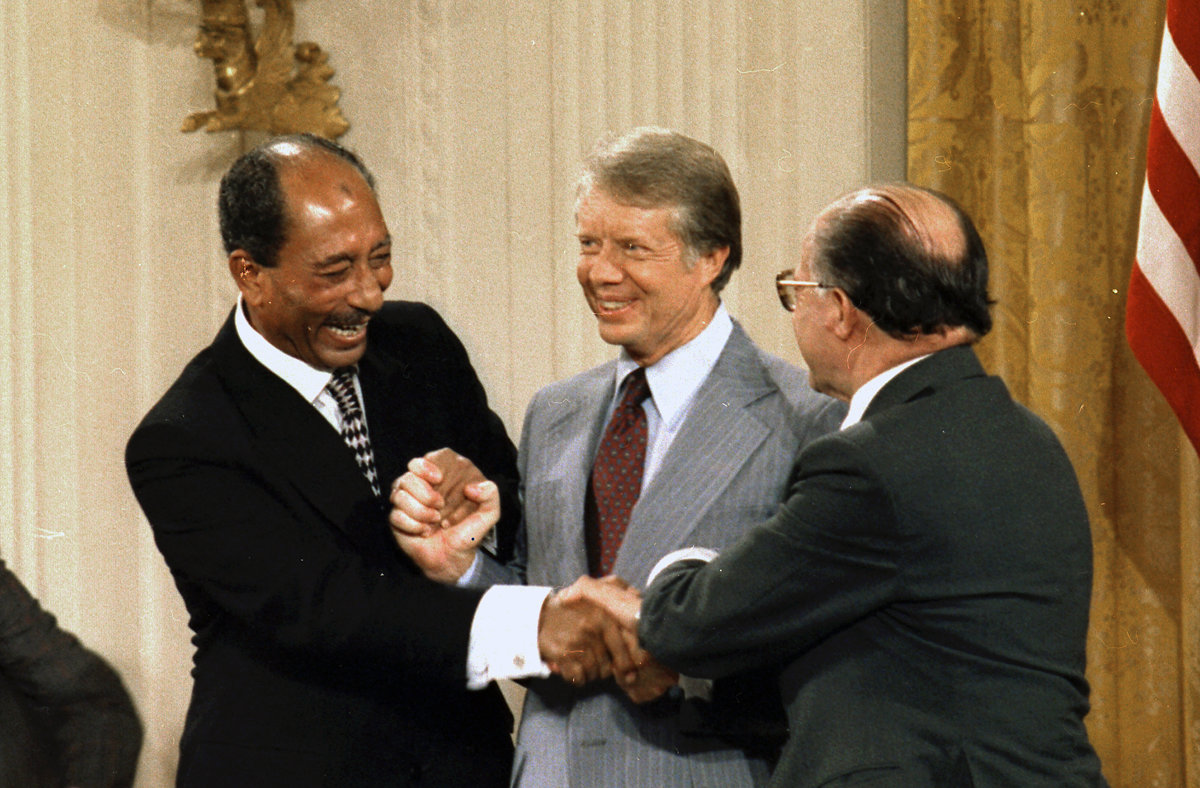 The Camp David Accords were signed by Egyptian President Anwar Sadat and Israel Prime Minister Menachem Begin. These secret negotiations took place at Camp David and was officially signed at the White House with President Jimmy Carter witnessing it. The Camp David Accords were about disagreements that the Egyptians had with the Israelites. One part of the agreement was that a government would be set up so that the people could rule over themselves. The second and third parts of the first agreement were about the relations between Israel and Egypt. The second part of the Accords outlined a peace treaty, which was signed 6 months after the meetings.
The Camp David Accords were signed by Egyptian President Anwar Sadat and Israel Prime Minister Menachem Begin. These secret negotiations took place at Camp David and was officially signed at the White House with President Jimmy Carter witnessing it. The Camp David Accords were about disagreements that the Egyptians had with the Israelites. One part of the agreement was that a government would be set up so that the people could rule over themselves. The second and third parts of the first agreement were about the relations between Israel and Egypt. The second part of the Accords outlined a peace treaty, which was signed 6 months after the meetings.
The Iran hostage crisis
On Nov. 10, 1979, six days into the 444-day hostage crisis, Carter ordered Attorney General Benjamin Civiletti to begin deportation proceedings of Iranian students and only Iranian students found to be illegally in the United States. The Attorney General always had that authority, and attorneys general have exercised it to a larger or lesser extent, depending on the administration The difference with Carter’s order is that it targeted a specific class of people, a specific nationality. In that regard, Carter was giving in to public pressure to look like he was “doing something” in the face of the hostage crisis in its early days.On April 7, 1980, immediately after Ayatollah Khomeini backed the student take-over of the U.S. Embassy in Tehran, Carter cut all diplomatic ties with Iran, imposed sanctions, froze Iranian assets, and ordered the issuance of visas to Iranian nationals halted in most circumstances not an uncommon ploy between nations that end their diplomatic relations. Currently, for example, there is no visa service in Syria, Yemen, Libya and Belarus.Carter’s order was to “invalidate all visas issued to Iranian citizens for future entry into the United States, effective today,” he said on April 7, 1980. “We will not reissue visas, nor will we issue new visas, except for compelling and proven humanitarian reasons or where the national interest of our own country requires. This directive will be interpreted very strictly.It stands as the longest hostage crisis in recorded history.President Jimmy Carter called the hostages "victims of terrorism and anarchy" and said: "The United States will not yield to blackmail." The crisis is considered a pivotal episode in the history of Iran–United States relations. Political analysts cite it as a major factor in the downfall of Jimmy Carter’s presidency and his landslide loss in the 1980 presidential election.With the completion of negotiations, the hostages were released on January 20, 1981. That day, at the moment President Reagan completed his 20‑minute inaugural address after being sworn in, the 52 American hostages were released to U.S. personnel. There were 66 original captives: 63 taken at the embassy and three captured and held at the Foreign Ministry offices. Three of the hostages were operatives of the CIA.Thirteen hostages were released November 19–20, 1979, and one was released on July 11, 1980.The hostage-taking was unsuccessful for Iran in some respects. It lost international support for its war against Iraq, and the negotiated settlement was considered almost wholly favorable to the United States because it did not meet any of Iran’s original demands. Nevertheless, the crisis strengthened Iranians who had supported the hostage-taking. Anti-Americanism became even more intense.The story goes that on the day of his inauguration, in January 1981, President Reagan convinced the Iranian regime to free the American Embassy hostages more or less just by glaring harshly in the direction of Tehran, which quailed in the face of his unyielding toughness and released the Americans immediately.According to this appealing version of recent history, Iran had kept the hostages during the Carter administration.Reagan’s red-blooded American resolve that they acquiesced the second he was sworn into office. The moral of the story, therefore, is that negotiating with Iran or any of America’s enemies is a sign of harmful weakness, whereas refusal to negotiate shows Reagan like strength that will protect Americans.There was a clear consensus among Reagan's advisers that his administration must, above all, prevent the hostage issue from overshadowing vital American foreign-policy interests. To quote one strategist on the President-elect's team: ''The administration should conduct quiet negotiations but get the hostage issue off the front page, which Carter couldn't do.''Reagan's strategy in the final days of the transition was to encourage the Iranians to come to terms quickly with Carter rather than look for a better deal from him. By alluding to Iranian leaders as ''barbarians'' guilty of kidnapping, his aides said he was deliberately signaling his intention to switch from Carter's conciliatory approach to Teheran to a much tougher line.But the White House, in a last effort to break the deadlock, came up with a counterproposal calculated to overcome Teheran's mistrust of U.S. intentions. The offer, delivered by Algerian diplomats on January 2, said release of the hostages would be followed by the deposit in an escrow account outside the U.S. of roughly 6 billion dollars almost immediately and additional billions in frozen assets as these funds were released by the courts.Teheran's response to that offer will determine whether the crisis can be liquidated before Reagan takes office.As an accompaniment to the haggling between Washington and Teheran, the Iranians kept the American people on an emotional roller coaster through the holiday season
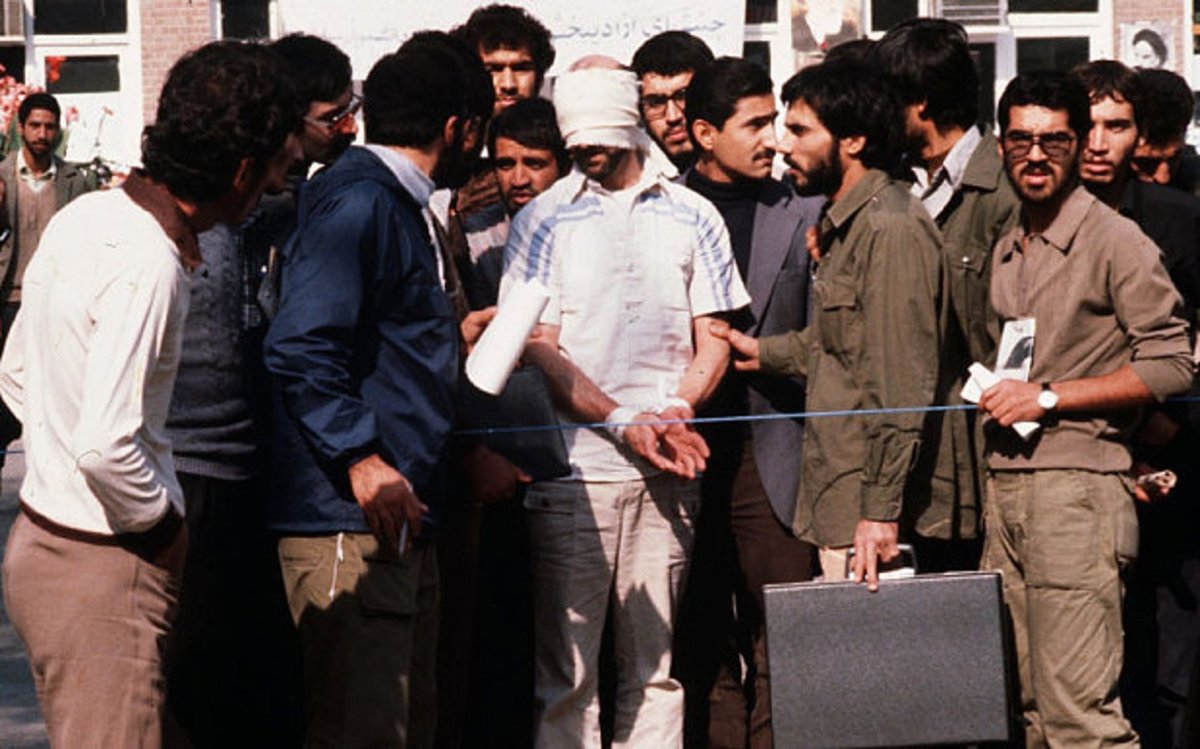
On Jan. 20, 1981, Iran released 52 Americans who had been held hostage
for 444 days, minutes after the presidency had passed from Jimmy Carter
to Ronald Reagan. The hostages were placed on a plane in Tehran as
Reagan delivered his inaugural address.

